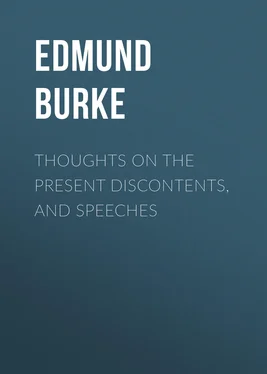It may appear somewhat affected, that in so much discourse upon this extraordinary party, I should say so little of the Earl of Bute, who is the supposed head of it. But this was neither owing to affectation nor inadvertence. I have carefully avoided the introduction of personal reflections of any kind. Much the greater part of the topics which have been used to blacken this nobleman are either unjust or frivolous. At best, they have a tendency to give the resentment of this bitter calamity a wrong direction, and to turn a public grievance into a mean personal, or a dangerous national, quarrel. Where there is a regular scheme of operations carried on, it is the system, and not any individual person who acts in it, that is truly dangerous. This system has not risen solely from the ambition of Lord Bute, but from the circumstances which favoured it, and from an indifference to the constitution which had been for some time growing among our gentry. We should have been tried with it, if the Earl of Bute had never existed; and it will want neither a contriving head nor active members, when the Earl of Bute exists no longer. It is not, therefore, to rail at Lord Bute, but firmly to embody against this Court party and its practices, which can afford us any prospect of relief in our present condition.
Another motive induces me to put the personal consideration of Lord Bute wholly out of the question. He communicates very little in a direct manner with the greater part of our men of business. This has never been his custom. It is enough for him that he surrounds them with his creatures. Several imagine, therefore, that they have a very good excuse for doing all the work of this faction, when they have no personal connection with Lord Bute. But whoever becomes a party to an Administration, composed of insulated individuals, without faith plighted, tie, or common principle; an Administration constitutionally impotent, because supported by no party in the nation; he who contributes to destroy the connections of men and their trust in one another, or in any sort to throw the dependence of public counsels upon private will and favour, possibly may have nothing to do with the Earl of Bute. It matters little whether he be the friend or the enemy of that particular person. But let him be who or what he will, he abets a faction that is driving hard to the ruin of his country. He is sapping the foundation of its liberty, disturbing the sources of its domestic tranquillity, weakening its government over its dependencies, degrading it from all its importance in the system of Europe.
It is this unnatural infusion of a system of Favouritism into a Government which in a great part of its constitution is popular, that has raised the present ferment in the nation. The people, without entering deeply into its principles, could plainly perceive its effects, in much violence, in a great spirit of innovation, and a general disorder in all the functions of Government. I keep my eye solely on this system; if I speak of those measures which have arisen from it, it will be so far only as they illustrate the general scheme. This is the fountain of all those bitter waters of which, through a hundred different conducts, we have drunk until we are ready to burst. The discretionary power of the Crown in the formation of Ministry, abused by bad or weak men, has given rise to a system, which, without directly violating the letter of any law, operates against the spirit of the whole constitution.
A plan of Favouritism for our executory Government is essentially at variance with the plan of our Legislature. One great end undoubtedly of a mixed Government like ours, composed of Monarchy, and of controls, on the part of the higher people and the lower, is that the Prince shall not be able to violate the laws. This is useful indeed and fundamental. But this, even at first view, is no more than a negative advantage; an armour merely defensive. It is therefore next in order, and equal in importance, that the discretionary powers which are necessarily vested in the Monarch , whether for the execution of the laws , or for the nomination to magistracy and office , or for conducting the affairs of peace and war , or for ordering the revenue , should all be exercised upon public principles and national grounds
Конец ознакомительного фрагмента.
Текст предоставлен ООО «ЛитРес».
Прочитайте эту книгу целиком, купив полную легальную версию на ЛитРес.
Безопасно оплатить книгу можно банковской картой Visa, MasterCard, Maestro, со счета мобильного телефона, с платежного терминала, в салоне МТС или Связной, через PayPal, WebMoney, Яндекс.Деньги, QIWI Кошелек, бонусными картами или другим удобным Вам способом.












